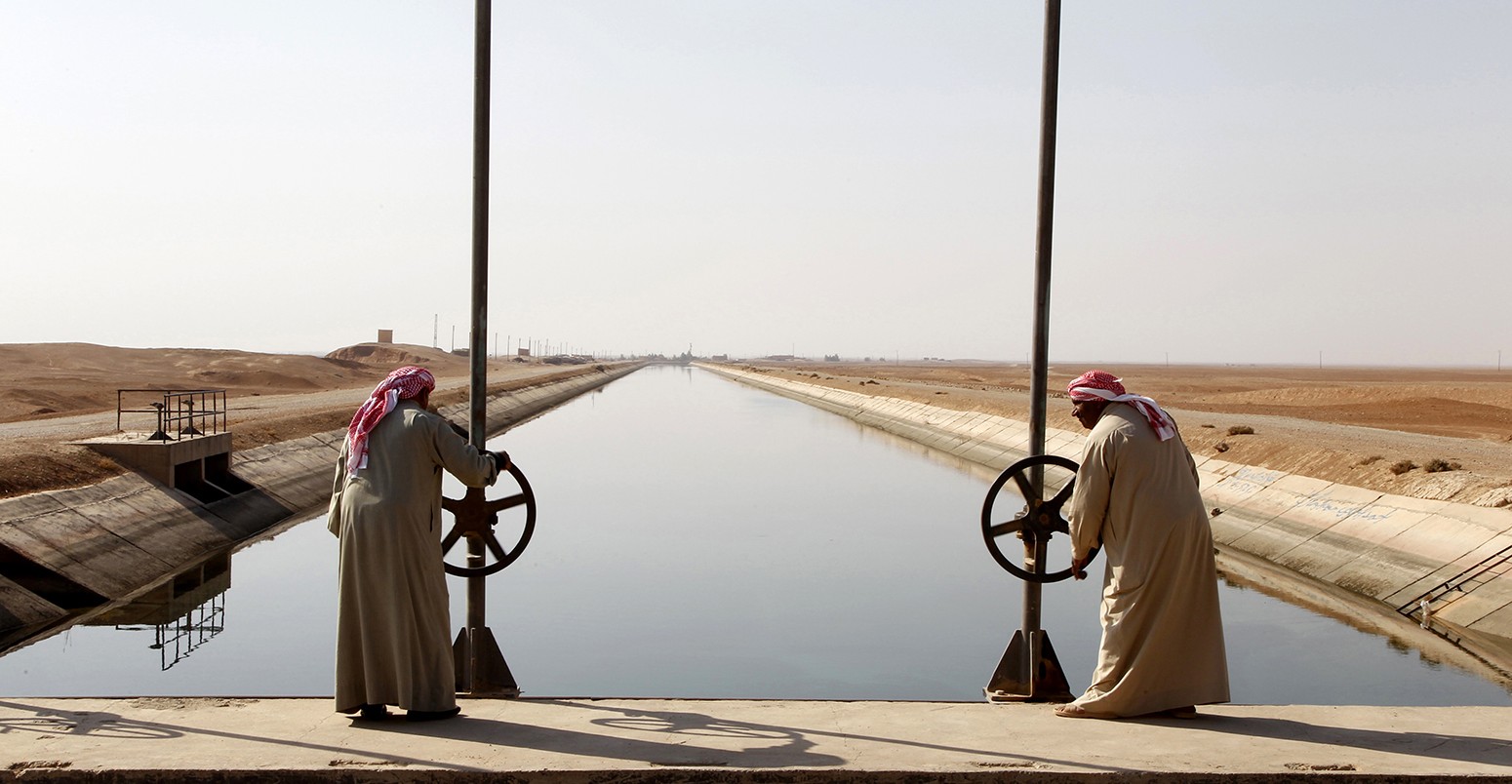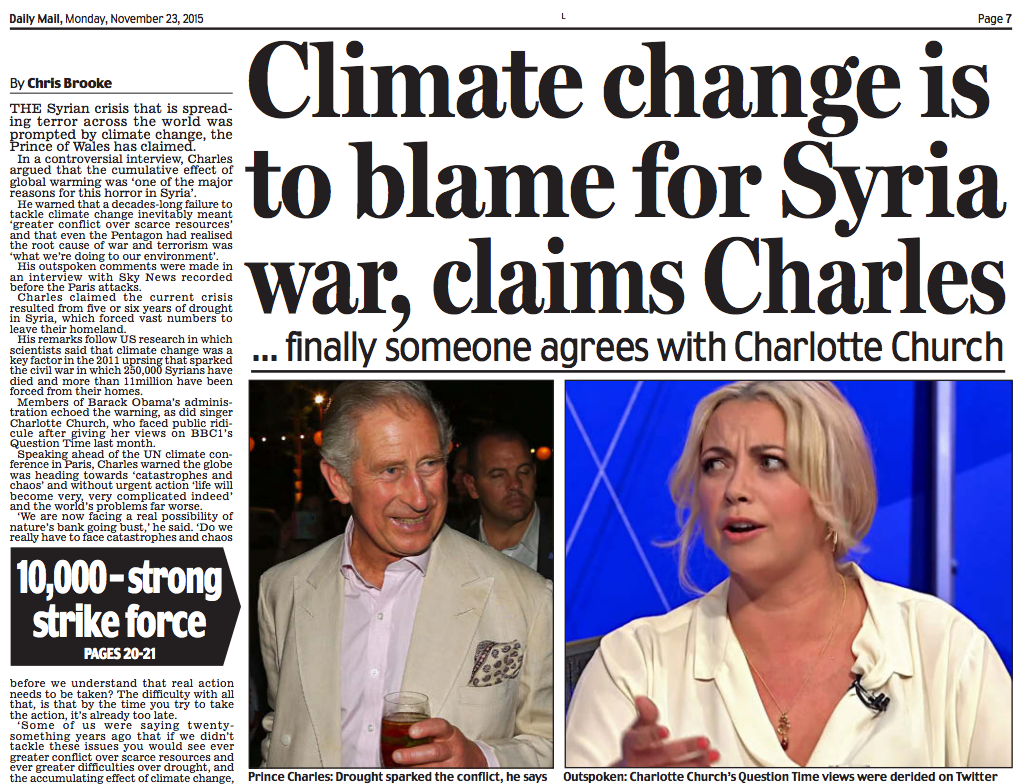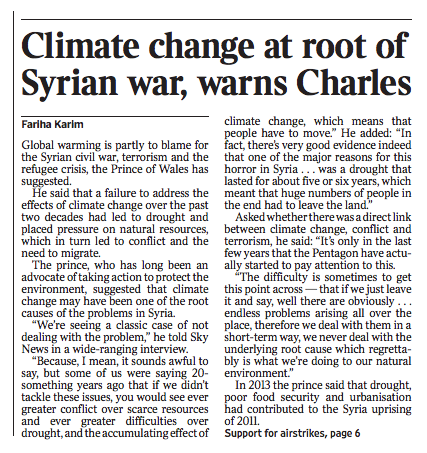
Factcheck: Media reacts to Prince Charles’s comments on Syria and climate change
Roz Pidcock
11.23.15Roz Pidcock
23.11.2015 | 5:04pmA Sky News interview with Prince Charles has received a lot of media attention today. Many of today’s newspapers are carrying comments by the Prince in which he appears to pin the blame for the Syrian conflict on climate change.
With such a sensitive and politically-charged topic as this, the connection between climate change and events leading up to the Syrian crisis are inevitably more nuanced than the headlines suggest. Carbon Brief takes a look.
Prince Charles speaks to Sky News royal correspondent Rhiannon Mills about climate change.
Pinning the blame
Some of today’s papers appear to take their cue from the Sky News article trailing the in-depth interview with Prince Charles. Sky’s headline reads, “Charles: Syria’s War Linked To Climate Change”.
Stronger wording from some other news outlets more directly suggests the prince pins the blame for the conflict on rising temperatures. The Sun’s front page says: “PRINCE Charles has blamed the rise of IS and the migrant crisis on climate change”. The paper’s lead editorial says making such a link is an “absurd idea”.
The Sun claims Prince Charles says climate change is *the* cause of ISIS; but he claimed *one* of causes. Different pic.twitter.com/PkmXmtMyw9
— Leo Hickman (@LeoHickman) November 23, 2015
Elsewhere, the Daily Express says, “DROUGHT led to rise in terror: Prince Charles blames CLIMATE CHANGE for war in Syria”. The Telegraph says, “Prince Charles has suggested the cause of conflict in Syria is climate change“, while the Daily Mail calls the interview “controversial”, adding that: “The Syrian crisis that is spreading terror across the world was prompted by climate change, the Prince of Wales has claimed.”
The Prince’s words, as quoted in the Sky News piece, aren’t as strong as these headlines would suggest, however. Though the interview transcript isn’t yet available in full, he appears to identify climate change as one of several contributing factors, not the sole cause. He says:
In fact, there’s very good evidence indeed that one of the major reasons for this horror in Syria, funnily enough, was a drought that lasted for about five or six years, which meant that huge numbers of people in the end had to leave the land but increasingly they came into the cities.
A few other headlines reflect this more nuanced view. For example, a Press Association story in The Guardian says: “Prince Charles: climate change may have helped cause Syrian civil war.” Similarly, the BBC says the Prince believes climate change “may have been a factor in the emergence of civil war in Syria”.
Rather than suggesting climate change is a “root cause” of the Syrian conflict – as some of today’s coverage explicitly suggests – Prince Charles appears to use that particular phrase in the Sky interview to make a wider point about the growing risk of conflict over strained resources. Asked if he thought there was a direct link between climate change, conflict and terrorism in general, Prince Charles answered:
It’s only in the last few years that the Pentagon have actually started to pay attention to this. I mean It has a huge impact on what is happening. The difficulty is sometimes to get this point across. If we just leave it and say, well there are obviously lots of problems arising all over the place, therefore we deal with them in a short-term way, we never deal with the underlying root cause, which, regrettably is what we’re doing to our natural environment.
A contributing factor
So, to what extent is climate change implicated in the Syrian conflict?
In an article earlier this year, Carbon Brief wrote an in-depth explainer on this question after new research found human-caused climate change could have had an influence.
The paper suggested that against a backdrop of social, economic and political tensions in Syria, a severe drought that began in 2006 provided a catalyst that helped spark the conflict. The study found that human-caused climate change had made such droughts in the region more than twice as likely.
Research into the impacts of climate change on drought in the region is ongoing. A recent paper from this month’s special issue of the Bulletin of the American Meteorological Society says that climate change made the lack of rainfall during the 2014 drought about 45% more likely.
Syria’s economy relies heavily on agriculture, which, in turn, relies heavily on water. In 2007-08, winter rainfall across Syria fell by a third, with some areas receiving no rain at all. This lack of rainfall together with rising temperatures caused a drop in soil moisture, with serious knock on effects for agriculture.
A reliance on imported crops caused prices to more than double, while the government’s decision to withdraw food and fuel subsidies made food even less affordable. Farmers and their families were forced to abandon their land, heading to urban areas in search of work. The expanding urban populations resulted in overcrowding, unemployment and crime, a rapidly deteriorating situation that was largely neglected by the Syrian government, the authors explained.
A very specific set of circumstances led to the crisis unfolding and it’s impossible to quantify the importance of each individual factor, the study’s lead author, Dr Colin Kelley from the University of California, told Carbon Brief at the time of the study. But, he said, the drought was integral in escalating the Syrian people’s underlying discontent with their government, adding:
The long term trends made the recent drought more severe and there is a very clear sequence of events leading to the uprising that was initiated by this most severe drought.
Co-author on the study, Prof Richard Seager from Columbia University told Carbon Brief:
We’re not saying drought caused the war. We’re saying that added to all the other stressors, it helped kick things over the threshold into open conflict. And a drought of that severity was made much more likely by the ongoing human-driven drying of that region.
Human security
The potential for climate change to exacerbate existing social, political and economic problems has received international attention recently, particularly in the US.
In a speech earlier this month, Senator John Kerry told a naval base and university in Norfolk, Virginia:
It’s not a coincidence that immediately prior to the civil war in Syria, the country experienced its worst drought on record…I am not suggesting that climate change was the primary reason for the crisis in Syria – obviously, it wasn’t…But the drought that devastated communities across the country exacerbated instability on the ground and made a bad situation worse and forced people to migrate.
Democratic presidential-hopeful, Hillary Clinton, made a similar point earlier this month when she was asked what the US could do in the light of the Syrian refugee crisis. She commented:
We have to ask ourselves: Why is this happening? Because of terrible governance, because of corruption, because of conflict, because of climate change, there are so many reasons why people are being, in their minds, forced to leave and try to get to safety.
Citing climate change as a national security issue much further afield than Syria, President Barack Obama said in May this year:
Understand, climate change did not cause the conflicts we see around the world, yet what we also know is that severe drought helped to create the instability in Nigeria that was exploited by the terrorist group Boko Haram.
For a more detailed discussion on understanding climate change as a security issue, Carbon Brief featured a guest post back in March by Prof Halvard Buhaug, research director and research professor at the Peace Research Institute, Oslo (PRIO). He wrote:
Researchers should avoid the naive assumption of a simple and direct cause-and-effect link between climate and conflict. We should specify how a climatic condition could cause social unrest directly, or how they could contribute to existing problems.
As a more nuanced discussion about these issues reveals, suggesting climate change is the only cause or “root cause” of the Syrian conflict is far too simplistic. In addition, wherever these conversations crop up, we should be wary of conflating climate change with a single drought, and social unrest with terrorism. But as research unravels how factors layered on top of each other in Syria, it seems uncontroversial to say that the drought amplified tensions in the country that eventually erupted in conflict, and that climate change played a role by increasing the chances of such a severe drought occurring.
Main image: A view of a water canal running from the Euphrates river into the semi-desert region of eastern Syria. Credit: © KHALED AL-HARIRI/Reuters/Corbis.
-
Factcheck: Media reacts to Prince Charles' comments on Syria and climate change



